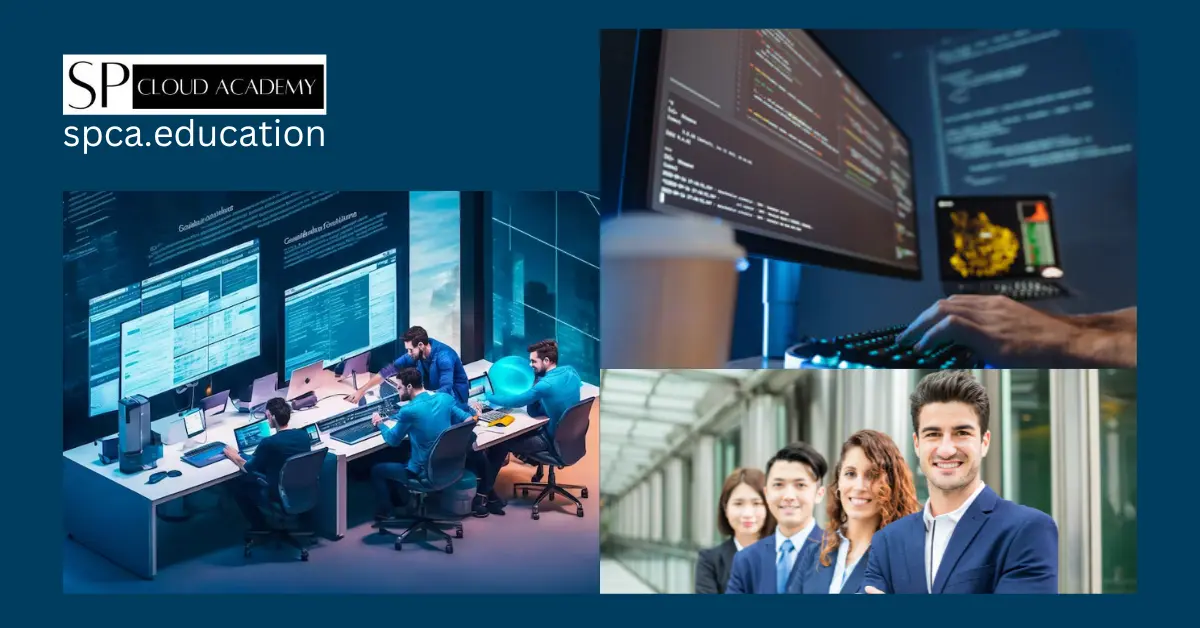A career in information technology (IT) is a profession that involves the use of computers and telecommunications equipment to manage, process, and distribute information. IT professionals use their skills to help organizations solve problems, improve efficiency, and gain a competitive advantage. With the ever-increasing reliance on technology, the demand for IT professionals continues to grow. However, choosing a career in IT requires careful consideration and planning. In this article, we will explore various aspects of a career in information technology, including IT competencies, trending job sectors, learning paths, vendor certifications, career planning, and job selection.
IT career planing and job selection
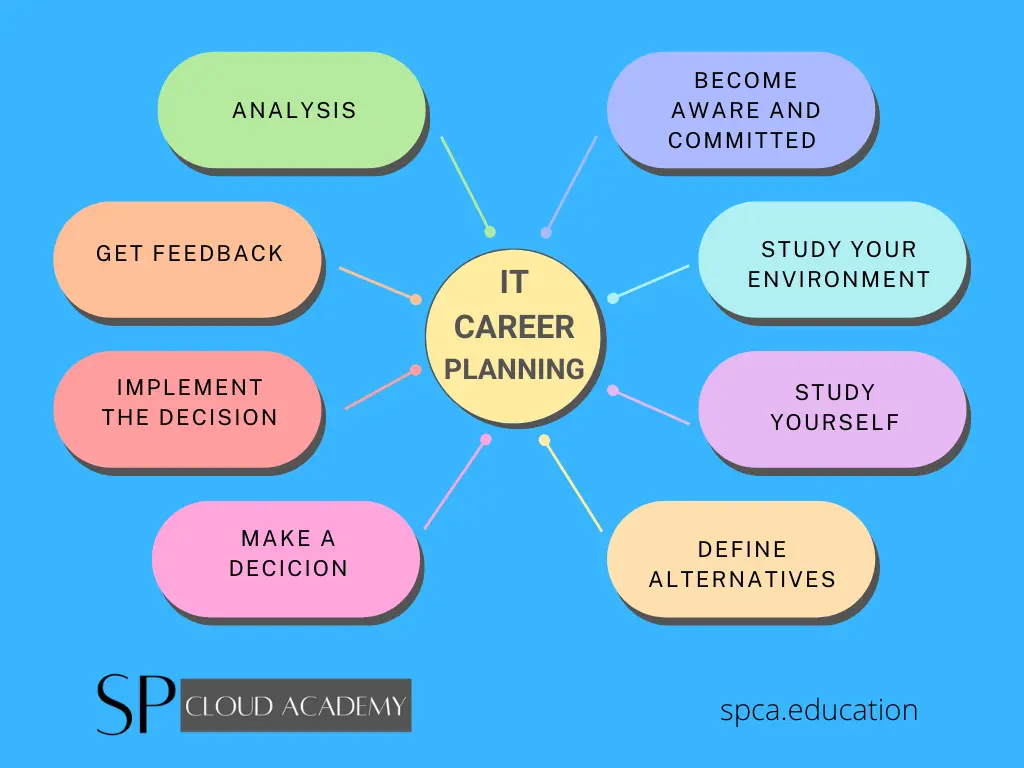

The following points must be considered while choosing a career:
- What do you enjoy or feel comfortable doing?
- What are your future academic plans?
- Whether it is financially viable to undertake Professional IT Training – traditional or online based.
- Ability to obtain professional or vendor certification.
- Are you interested in learning on your own?
- Do you have a strong willingness to accept professional work as a challenge and perform it correctly?
- Do creative and innovative ideas work in you?
- Whether there is a desire to go outside the surroundings.
Competencies in IT
To excel in the field of information technology, it is essential to possess a set of core competencies. These competencies can be categorized into basic IT competencies, core competencies in IT, and soft skills.
Basic IT Competencies
Basic IT competency refers to the knowledge and skills that are essential for anyone who wants to work in the IT field. These skills include the ability to use computers and software applications, troubleshoot problems, and understand basic networking concepts.
- Computer Operation Principles
- Clear Concepts about PC hardware and Software
- PC Assembling-Dissembling
- OS and Application Software Installation, Configuration and Management
- Windows OS Management
- Android OS and Apps Handling
- Basic Linux based OS Handling
- BIOS, Device Drivers, Patch and Service Packs Handing
- Office Application-MS Office latest version, Office-365, Google Office Apps
- Cloud Storage Handling-MS OneDrive, Google Drive and others
- Advanced Internet Surfing
- Basic Software and Hardware Troubleshooting
- Basic Data Security
- Cyber Security Concepts
Core Competencies in IT
Core competencies in IT are the skills and abilities that are essential for success in the IT field. These competencies are the foundation for more advanced IT skills, and they are essential for understanding and troubleshooting IT problems.
- LAN/SoHo Network Setup
- Internet Connection Sharing and Access Control
- Basic Routing and Switching
- Data and Resource sharing over network
- Access Management
- Basic Network Troubleshooting
- Office Automation Concepts
- Cloud Computing Concepts
- Application of Hypervisor
- Zero and Thin Computing Concepts
- Windows as a Service
- Computer Workplace Supervision
- Surveillance and Security Systems Management
Soft skills
Soft skills are non-technical skills that are essential for success in the IT field. These skills include the ability to communicate effectively, work well with others, and be adaptable to change. Some of the soft skills that are highly valued in the IT industry include:
- Adaptability
- Dependability
- Ethics
- Motivation
- Professionalism
- Teamwork
- Creative Problem Solving
- Time Management
- Dealing with Paradox
Trending Professional Area in IT

The IT industry is constantly evolving, and certain job sectors are currently experiencing significant growth and demand. It is important to stay updated with the latest trends in the industry to make informed career choices. Here are some of the trending job sectors in IT:
Software Engineering
Software engineering is the discipline of applying engineering principles to the design, development, and maintenance of software. It is a broad field that encompasses a wide range of activities.
- Apps Developer
- Software Engineer
- Solution Developer/Software Architect
Technical Skills Needed:
- General Skills: Data structure & algorithm, SDLC
- Software Engineering Principles
- Languages: C/C++, Java, Python, PHP
- Framework: .NET, Laravel, Laravel, React.js
- IDE: JDK, PyCharm, Visual Studio Code, Android Studio
- UX design
- Multi-OS Software Deployment
- Database: SQL, Xquery
- Software Testing and Evaluating
- Project Management
Soft skills:
- Analytical Power
- Critical thinking, creativity, and problem-solving
- Communication
- Patience and Work ethics
- Open-mindedness and adaptability
- Confidence
- Management (people, time and project)
- Extensive knowledge of agile methodologies
- Teamwork and collaboration
Learning Platforms:
- Microsoft Learn
- GitHub
- W3Shcools
- Java Point
- Programiz
- Codeacademy
- Tutorialspoint
- learnpython.org
Vendor Certifications:
- CPA – C++ Certified Associate Programmer Certification
- Oracle PL/SQL Developer Certified Associate (JP)
- Oracle Certified Professional, MySQL 5.7 Database Administrator
- MySQL 8.0 Database Developer Oracle Certified Professional
- Microsoft Certified: DevOps Engineer Expert
- PCAP™ – Certified Associate in Python Programming
- Zend Certified PHP Engineer
- Professional Cloud DevOps Engineer (Google)
More details: https://spca.education/software-engineering-career/
Systems Engineering
Computer systems engineering is a broad field that encompasses the design, development, and maintenance of computer systems. It is a multidisciplinary field that draws on knowledge from computer science, electrical engineering, and mathematics. Computer systems engineers typically work on projects that involve the development of new computer systems or the improvement of existing systems.
- Systems Supports Technician/Engineer
- Systems Administrator/Engineer
- Systems Solution Architect/Analyst
Technical Skills Needed:
- BIOS: Configuration, Upgradation and Security
- OS: Installation, Configuration, Updates, Management
- Remote Installation, Live OS
- Access Control and User Management
- Registry-Group Policy-CLI-Batch Scripting
- Server OS: Installation, Configuration, Updates, Management
- File Management
- Various Server Configuration and Management
- ADS: User, OU and Domain Management
- Storage: RAID, NAS
- Hypervisor: VM management
- Zero And Thin Computing
- Information Security:
- Core and Virtual Networking
- Cloud Computing-IaaS, PaaS, SaaS, DaaS
- Data Center Development-OnPrem and Hybrid
- Backup: Systems Preparation, Migration, Cloning and Imaging, Clustering
- End Points Management
- RAS, Remote administration & supports
Soft skills:
- Analytical Power
- Critical thinking, creativity, and problem-solving
- Open-mindedness and adaptability
- Confidence
- Management (people, time and project)
- Teamwork and collaboration
Learning Platforms:
- Microsoft Learn
- Cisco Network Academy
- VMware Learning
- IEEE Learning Network
- Red Hat Learning
Vendor Certifications:
- CompTIA A+
- CompTIA Network+
- CompTIA Server+
- Microsoft Certified: Windows Server Hybrid Administrator Associate
- Microsoft Certified: Azure Administrator Associate
- Microsoft Certified: Azure Solutions Architect Expert
- Red Hat Certified System Administrator
- Red Hat Certified Engineer
Network Engineering
Computer network engineering is a field of computer science that deals with the design, implementation, and maintenance of computer networks. Computer network engineers are responsible for ensuring that computer networks are reliable, secure, and efficient.
- Network Supports Engineer
- Network Administrator/Engineer
- Network Architect
Technical Skills Needed:
- Systems Engineering Skills
- Network Principles: Networking standards and protocols, Topologies, Medias, Devices, OS
- Routing and switching
- IP Address Management
- Routing Protocols
- Network Planning and Design
- Network Setup and deployments
- Subnetting and VLAN Handling
- Network Management Principles
- Cost-effective design and implementation
- Network identification and access control
- Resource Sharing and Access Control
- Remote access connectivity and administration
- Virtual networking
- Cloud computing connectivity
- Network Security and Disaster Recovery
- Network Automation
- Network Maintenance and Troubleshooting
- RAS, Remote administration & supports
Soft skills:
- Analytical Power
- Critical thinking, creativity, and problem-solving
- Open-mindedness and adaptability
- Confidence
- Management (people, time and project)
- Teamwork and collaboration
Learning Platforms:
- Microsoft Learn
- Cisco Network Academy
- VMware Learning
- IEEE Learning Network
- Red Hat Learning
- MikroTik Academy
Vendor Certifications:
- MikroTik Certified Network Associate
- CompTIA Network+
- CompTIA Server+
- CCNA, CCNP Enterprise, CCIE Enterprise Infrastructure
- Enterprise Routing and Switching, Professional (JNCIP-ENT)
- Professional Cloud Network Engineer (Google)
Career in computer networking: https://spca.education/career-in-computer-networking/
Becoming a Computer Network Specialist: A Step-by-Step Guide
Information Security
Information security (InfoSec) is the practice of protecting sensitive data from unauthorized access, use, disclosure, disruption, modification, or destruction.
- Security Supports Engineer
- Security Administrator/Engineer
- Cybersecurity Architect/Expert
Technical Skills Needed:
- Systems Engineering Skills
- Networking and System Administration Skills
- Network Security Control
- Data Life Cycle
- Identity and Access Management (IAM)
- Threat, Attacks, Mitigations
- Risk, Vulnerabilities
- Malwares
- Cryptography, Data Encryption
- PKI and Digital Signature
- Firewall Management
- Understanding of Hacking
- Data Forensics
- Cloud Computing and Virtual Networking
- Cloud ADS and Security
- Incident Management
- Security Policies
Soft skills:
- Analytical Power
- Critical thinking, creativity, and problem-solving
- Open-mindedness and adaptability
- Confidence
- Teamwork and collaboration
Learning Platforms:
- Microsoft Learn
- Cisco Network Academy
- VMware Learning
- EC Council
- The International Information System Security Certification Consortium, or (ISC)²
Vendor Certifications:
- CEH (Certified Ethical Hacker)
- OSCP (Offensive Security Certified Professional)
- CISA (Certified Information Security Auditor)
- GCIH (GIAC Certified Incident Handler)
- Certified Information Systems Security Professional (CISSP)
- Microsoft Certified: Azure Security Engineer Associate
- Microsoft Certified: Identity and Access Administrator Associate
- Microsoft Certified: Cybersecurity Architect Expert
- CyberOps Professional
- CCNP Security
- CCIE Security
- CompTIA Security+
- Professional Cloud Security Engineer (Google)
Data Engineering
Data engineering is a field of computer science that deals with the collection, storage, processing, and analysis of data. Data engineers build the systems that make it possible for data scientists to analyze data and make informed decisions.
- Database Admin
- Data Analyst
- Data Scientist
Technical Skills Needed:
- Systems Administration Skills
- Networking and System Administration Skills
- Structured-Unstructured Data
- Data Ingestion
- Data Mining
- Data Warehouse
- CRM and ERP
- ETL and Data Processing
- Batch and Steaming Data Handling
- Data Analysis, Reporting
- Power BI and Business Forecasting
- Big Data and Blockchain
- AI, IoT and Machine Learning
- Data visualization skills
- Data Security
Soft skills:
- Analytical Power
- Critical thinking, creativity, and problem-solving
- Open-mindedness and adaptability
- Confidence
- Teamwork and collaboration
Learning Platforms:
- Microsoft Learn
- Oracle University
Vendor Certifications:
- Microsoft Certified: Azure Data Engineer Associate
- Microsoft Certified: Customer Data Platform Specialty
- Microsoft Certified: Azure Data Scientist Associate
- Professional Data Engineer (Google)
- IBM Data Engineering Professional Certificate
- AWS Certified Data Analytics
- Arcitura Certified Big Data Architect
Web Platforms
A web career in IT is a broad term that encompasses a wide range of IT careers that involve working with websites and web applications.
- Web Designer
- Front End or Back End Developer/Web Apps Developer
- Full Stack Web Developer/ SEO Specialist
Technical Skills Needed:
- OS Handling
- Basic Networking
- Language: HTML, PHP, Java, Kotlin, Python, JavaScript
- Responsive Web Design Principles
- Database: SQL
- Framework: CSS, Django, Laravel, React
- CMS: WordPress, Joomla
- Design software like Photoshop and Illustrator and Sketch
- Web Security
- An understanding of SEO
- Web servers and Hosting
- Domain Registration
Soft skills:
- Strong creative ability
- Open-mindedness and adaptability
- Confidence
- Teamwork and collaboration
Learning Platforms:
- Codecademy
- Udemy
- Coursera
- Lynda / LinkedIn Learning
- Oracle University
- Zend
Vendor Certifications:
- Oracle Certified Professional, Java EE 7 Application Developer
- Oracle Certified Professional: Java SE 17 Developer
- Oracle Database PL/SQL Developer Certified Professional
- Microsoft Certified: Power Platform Developer Associate
- Microsoft Certified: DevOps Engineer Expert
- PCAP™ – Certified Associate in Python Programming
- Zend Certified PHP Engineer
- More Details: https://spca.education/web-development-career/, https://spca.education/how-to-become-a-full-stack-web-app-developer/
Graphics and Animation
A graphics and animation career is a field that deals with the creation of visual content, such as images, animations, and videos. Professionals in this field use their creativity and technical skills to bring ideas to life. There are many different paths you can take in a graphics and animation career, depending on your interests and skills.
- Graphic Designer
- Animator
- Art Director
Technical Skills Needed:
- Computing Skills
- Typography skills
- Adobe Creative Suite
- Adobe Creative Cloud
- Adobe Apps Suite
- Canva
- CorelDRAW
- Sketch
- MS PowerPoint
- MS Visio
- Digital Photography and Image Processing
Soft skills:
- Ideation (Mood boards, Idea Generation, etc.)
- Creativity and Emotional intelligence
- Storytelling
- Delivering Presentations
- Open-mindedness and adaptability
- Confidence
- Teamwork and collaboration
Learning Platforms:
- Adobe Digital Learning Services
- Linkedin Learning
- Visio training by Microsoft Supports
- eCornell
- Alison
- CorelDraw Learning Center
Vendor Certifications:
- Adobe Certified Professional
More Details: https://spca.education/graphic-design-career/
Cloud Computing and Virtualization
A career in cloud computing and virtualization in IT is a great way to combine your technical skills with your passion for innovation. Cloud computing and virtualization are two of the most important technologies in IT today, and there is a high demand for skilled professionals in this field.
- Cloud Supports Engineer
- Cloud Administrator
- Cloud Architect
Technical Skills Needed:
- Advanced Systems Administration Skills
- Advanced Networking
- Neatwork Management Skills
- Cloud Ownership models
- Clouds Deployment Models-IaaS, PaaS, SaaS, DaaS
- Cloud IAM
- Hypervisor
- VM Management
- Virtual Networking
- Data Center Deployment and Management
- Cloud Subscription ang Dashboard Management
- AI, IoT and Machine Learning
- Cloud security
- Cloud Storage
- Systems Preparation, Back up and Migration
- On-Prem Cloud Access and Integration
Soft skills:
- Analytical Power
- Critical thinking, creativity, and problem-solving
- Open-mindedness and adaptability
- Confidence
- Teamwork and collaboration
Learning Platforms:
- Microsoft Learn
- VMware Learning
- AWS Learning
Vendor Certifications:
- Microsoft Certified: Azure Fundamentals
- Microsoft Certified: Azure Administrator Associate
- Microsoft Certified: Azure Solutions Architect Expert
- The AWS Certified Solutions Architect
- Associate Cloud Engineer (Google)
- Professional Cloud Architect (Google)
- Professional Google Workspace Administrator
- IBM Cloud Professional Architect
- IBM Cloud Advanced Architect
- IBM Cloud Associate Site Reliability Engineer (SRE)
More details: Cloud Computing Career Planning and Development – SP Cloud Academy (spca.education)
AI and IoT
AI and IoT are two of the most rapidly growing fields in IT today. AI stands for Artificial Intelligence, and IoT stands for Internet of Things. AI is the ability of machines to think and act like humans, while IoT is the network of physical devices that are connected to the internet. A career in AI and IoT is a great way to combine your technical skills with your passion for innovation. These technologies are changing the way we live and work, and there is a high demand for skilled professionals who can work with them.
- IoT/AI Engineer
- AI Programmer/Machine Learning Engineer/Business Intelligence Developer
- AI Scientist
Technical Skills Needed:
- Advanced Systems Administration Skills
- Networking
- Distributed Computing
- Data Engineering
- Programming languages: Python
- Application Programming Interfaces (API)
- AI, IoT and Machine Learning
- Advanced Signal Processing
- Natural Language Processing
- Robotics Programming
- Exploratory data analysis
- Cyber Security
Soft skills:
- Analytical Power
- Critical thinking, creativity, and problem-solving
- Open-mindedness and adaptability
- Confidence
- Teamwork and collaboration
- Industry Knowledge
Learning Platforms:
- Microsoft Learn
- Cisco Network Academy
- AWS Learning
- Linkedin Learning
- Coursera
Vendor Certifications:
- Microsoft Certified: Azure AI Fundamentals
- Microsoft Certified: Azure AI Engineer Associate
- IBM Applied AI Professional Certificate
- IBM AI Engineering Professional Certificate
Digital Marketing
Digital marketing is the promotion of products or services using electronic media, such as the internet, social media, email, and mobile apps. It is a broad term that encompasses a variety of marketing activities, such as search engine optimization (SEO), pay-per-click (PPC) advertising, social media marketing, email marketing, and content marketing.
Digital marketing is a rapidly growing field, as more and more people are using the internet to research and purchase products and services. According to the Digital Marketing Institute, the global digital marketing industry is worth over $3 trillion.
- Digital Marketing Executive
- Digital Marketing Manager
- Digital Marketing Consultant
Technical Skills Needed:
- Computing skills
- Marketing Principles
- Inbound-Outbound Marketing
- Social Media Management
- Content Creation
- Digital Marketing Platforms
- Content Marketing
- Email marketing
- Web Surfing
- SEO & SEM
- Market Research
- Data Collection, Analysis and Reporting
- CRM
- Digital Photography
- Storytelling
- Strategic planning
Soft skills:
- Analysis Skills
- Critical thinking, creativity, and problem-solving
- Open-mindedness and adaptability
- Confidence
- Teamwork and collaboration
- Agility and adaptability
Learning Platforms:
- Microsoft Learn
- Google Garage
- HubSpot academy
- Hootsuite Academy
Vendor Certifications:
- Fundamentals of digital marketing by Google
- Google Analytics IQ Certification
- Hootsuite Social Marketing Certification
- Google Ads Certification
- HubSpot Content Marketing Certification
- HubSpot Inbound Marketing Certification
- Meta BluePrint Certification
- American Marketing Association (AMA) Digital Marketing Certification
- Bing Ads Certification
- HubSpot Email Marketing Certification
Read also:
The Rise of Digital Marketing-Based Freelancing and Remote Jobs: How to Thrive in the Digital Age
E-learning and Contents Development
E-learning and content development is a broad term that encompasses the creation and delivery of educational content through electronic media. It is a rapidly growing field, as more and more people are turning to online learning to improve their skills and knowledge.
- Digital Contents Developer
- CMS & LMS Developer
- E-Learning Specialist
Technical Skills Needed:
- Computing skills
- Graphics Design
- CMS & LMS
- Social Media Management
- Digital Content Creation
- E-Learning Authoring Tools
- Web Surfing
- Digital Photography
- Storytelling
- Strategic Planning
Soft skills:
- Analysis Skills
- Critical thinking, creativity, and problem-solving
- Open-mindedness and adaptability
- Confidence
- Teamwork and collaboration
- Agility and adaptability
Learning Platforms:
- Adobe Learn
- Udemy
- MOODLE Commuity
Vendor Certifications:
- Adobe Certifications
- Moodle Educator Certification
Vendor Certifications in IT
IT Vendor Certification is a skill certificate issued by the respective vendor online through a globally recognized standardized test, which is the most effective and fastest way to prove competence in a specific field. Its quality is equally recognized worldwide. This certificate represents your dedication, motivation and technical knowledge in the specific platform. Acquiring this certification will include those IT professionals whose skills are demonstrable. Through this you will not only acquire specific skills but also ensure the best opportunities and use of your work life, time and money. Along with an academic certificate, vendor certification will put you several steps ahead in the job market.

- Microsoft Certifications: https://docs.microsoft.com/en-us/certifications/
- Google Certifications: https://cloud.google.com/certification
- AWS Certifications: https://aws.amazon.com/certification/
- VMware Certifications: https://www.vmware.com/learning/certification.html
- IBM Certifications: https://www.ibm.com/training/credentials
- Oracle Certifications: https://education.oracle.com/oracle-certification-paths-all
- Cisco Certifications: https://learningnetwork.cisco.com/s/certifications
- Zend Certifications: https://store.zend.com/certification/php-certification
- Adobe Certifications: https://learning.adobe.com/certification.html
- RedHat Certifications: https://www.redhat.com/en/services/certifications
- CompTIA Certifications: https://www.comptia.org/certifications
- (ISC)² Information Security Certifications: https://www.isc2.org/Certifications
- EC Council Certifications: https://cert.eccouncil.org/certifications.html
- IEEE Certificates Program: https://innovationatwork.ieee.org/certificates/
Major Learning Platforms
Microsoft Learn is where everyone comes to learn: https://learn.microsoft.com/
Cisco Skills for All: https://skillsforall.com/
AWS Academy: https://aws.amazon.com/training/awsacademy/
VMware Learning: https://www.vmware.com/learning.html
Oracle Learning: https://learn.oracle.com/ols/user-portal
RedHat: https://learn.redhat.com/
Adobe Digital Learning Services: https://learning.adobe.com/
IBM Skills Academy is designed for academia worldwide: https://www.ibm.com/training/
Zend: https://www.zend.com/training/php
Online Resources
Resume Builders
Conclusion
A career in information technology offers vast opportunities for growth and success. By developing the necessary competencies, staying updated with the latest trends, acquiring relevant vendor certifications, and planning your career path strategically, you can pave the way for a fulfilling and rewarding IT career. Remember to continually learn and adapt to the evolving landscape of technology to stay competitive in the field. With dedication and passion, you can thrive in the dynamic world of IT and make a significant impact in the digital age.
Learn and Develop with SP Cloud Academy
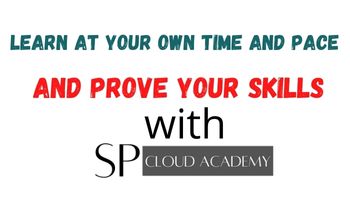
Related Posts
-
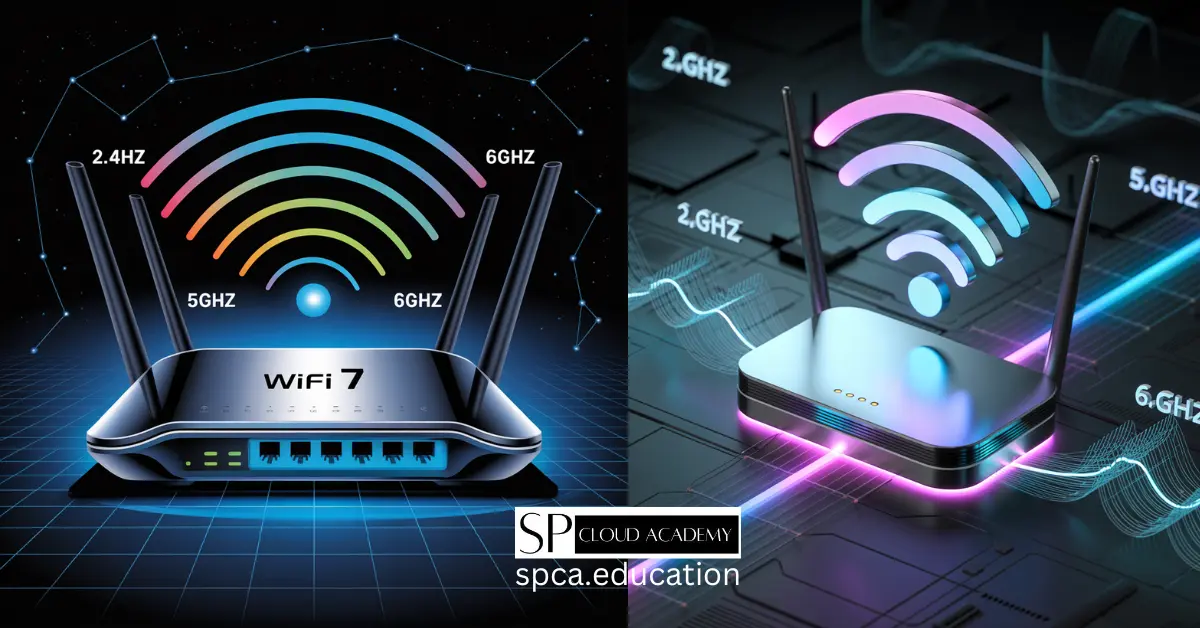
WiFi 7 Explained: The Next-Generation Wireless Technology for Ultra-Fast Speed and Low Latency
-

Short and Smart or Long and Strong? Choosing Between Skill-Based and Professional Diplomas
-

Why Software-Defined Networking Is the Future (And What That Means for You)
-
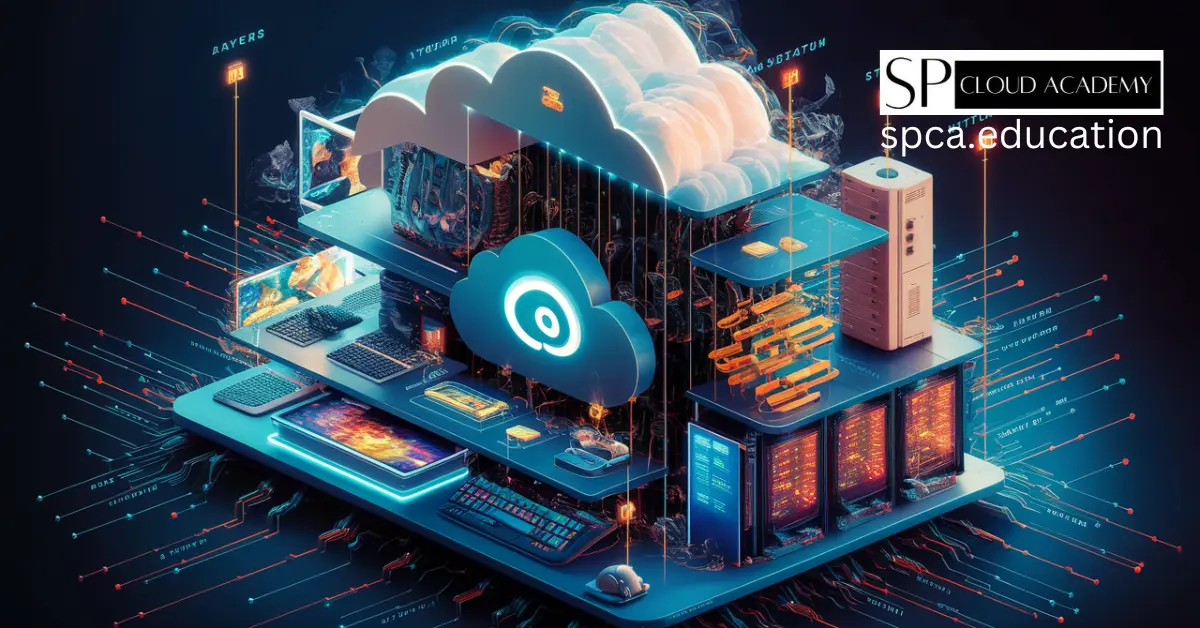
From Hardware to Apps: Mastering Every Type of Virtualization in Cloud Computing
-

The Ultimate Guide to the Best Open Source Identity and Access Management Solutions
-
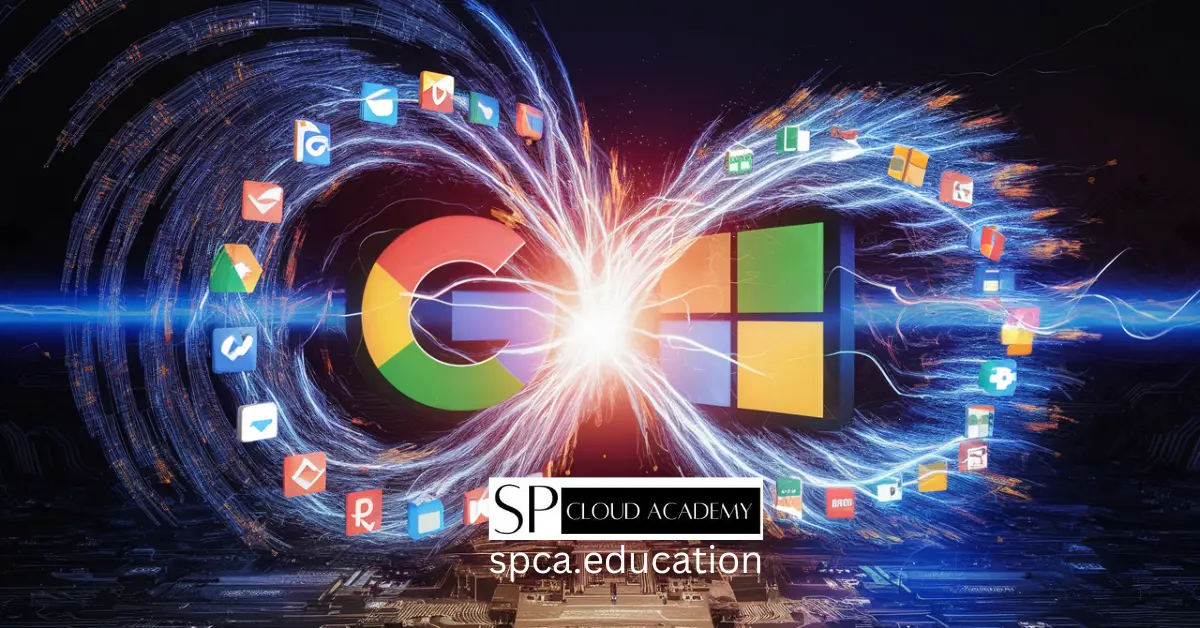
Battle of the Tech Titans: A Deep Dive into Google vs. Microsoft Ecosystems
